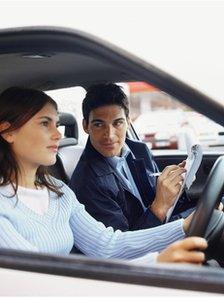Driving licences should be graduated, says RAC Foundation
- Published
- comments

Novice drivers could face four years of restrictions
Learner drivers in the UK should face a graduated system of licences to help reduce road deaths, says a report by the RAC Foundation.
The study suggests that hundreds of lives a year could be saved if such a system were adopted.
New drivers would face a four-year learning period during which they would be subject to restrictions.
The United States, Canada, Australia and New Zealand already have graduated learning for drivers.
The RAC Foundation said such countries had seen a significant reduction in the number of young people being killed in accidents.
Deaths among 17- to 24-year-olds have fallen by up to 60%, and the number of overall casualties has fallen by up to 32%.
"Putting a firm number on casualty reduction is hard because of the pick-and-mix approach to graduated licensing," said Prof Stephen Glaister, director of the RAC Foundation.
"But the evidence suggests that a full package of measures could reduce fatalities by anything up to 60%," he said.
In the UK, one in five novice drivers has an accident within six months of passing their test.
In 2011, more than 1,500 young drivers were killed or seriously injured, a rate of four a day, said the Foundation.
New system
The report says that the first 1,000 miles of driving may be the most important for cutting the risk of an accident.

Drivers could also face a stricter drink-drive limit, under the proposals
So it is calling for a three-stage, graduated, system. New drivers would face restrictions for four years:
Stage one
A one-year minimum driving period, before the test is taken. Drivers would need to experience a wide range of conditions, including winter driving and night driving.
Stage two
After the test is taken, drivers would face restrictions for a further year. The number of passengers they could carry might be limited, and night driving might also be restricted.
Stage three
A further two-year probationary period. If during the period a driver receives six penalty points, they would have to take a re-test.
The Foundation would also like to see a stricter drink-drive limit.
At the moment the legal maximum is 80mg of alcohol per 100ml of blood.
But this figure could be reduced to 50mg.
Insurance
Earlier this year, the Association of British Insurers (ABI) said young drivers could save up to 20% on their insurance premiums, if restrictions were put in place for newly-qualified drivers.
This might include limits on night-time driving, and restrictions on the number of passengers they are able to carry.
As a result new drivers might be able to save as much as £370 a year.
The government is currently considering a range of similar proposals, and will shortly decide whether to change the rules on driving tests.
- Published5 March 2013
- Published26 March 2013
- Published1 December 2012